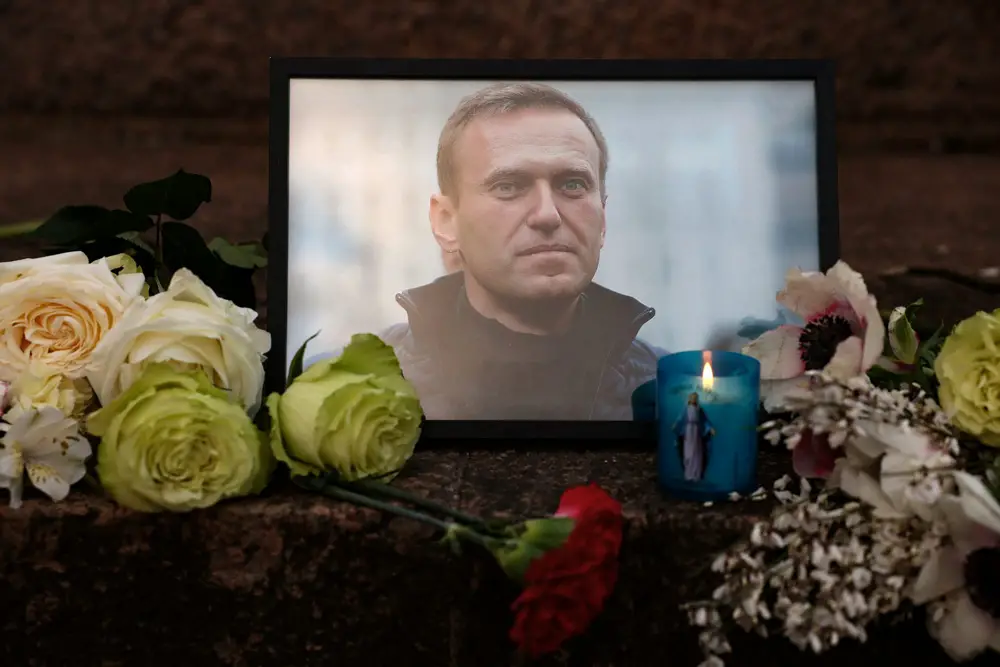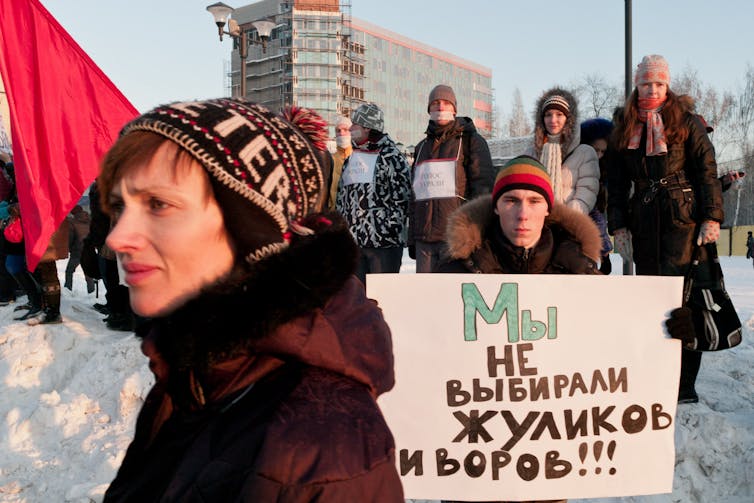
By Regina Smyth
Long lines of Russians endured subzero temperatures in January 2024 to demand that anti-Ukraine war candidate Boris Nadezhdin be allowed to run in the forthcoming presidential election. It was protest by petition – a tactic that reflects the legacy of Alexei Navalny, the longtime Russian pro-democracy campaigner. Authorities say Navalny, a persistent thorn in the side of Russian President Vladimir Putin, died in prison on Feb. 16, 2024.
For more than a decade, Navalny fought Russian authoritarianism at the ballot box and on the streets as the most recognizable face of anti-Putinism, filtering support to candidates brave enough to stand against the Kremlin’s wishes.
Often opposition does not translate into electoral success. Nadezhdin supporters did not expect that their man could actually defeat Putin in the vote scheduled for March 20, 2024. Given how tightly the Kremlin controls politics in Russia, the result of the presidential election is a foregone conclusion.
But for many Russians, the opportunity to support Nadezhdin’s candidacy was the only legal means they had to communicate their opposition to Putin and the war. The fact that authorities ultimately barred Nadezhdin from participating suggests that the Kremlin remains cautious about any candidate who punctures official narratives of a nation united behind Putin’s war in Ukraine.
That effort to protest the election seems all the more poignant following Navalny’s death. It reflected the heart of a strategy that Navalny developed over more than a decade and that I have written about since 2011.
The movement remains
Navalny understood that opposition in Russia was about exposing the corruption in Putin’s party, United Russia; shining a light on electoral manipulation; and alerting the world to growing political violence.
Navalny highlighted the very real opposition to Putin and authoritarian rule that exists in Russia despite attempts to hide it from the world.
To achieve these goals, team Navalny – and it is important to remember that while Navalny the man is dead, the movement he sparked remains – repeatedly used elections to make the opposition visible and spark political debate.
Navalny emerged as a political force in 2011, when he kicked off a large national protest movement ahead of the 2012 parliamentary election by labeling Putin’s United Russia the “Party of Crooks and Thieves.” He held contests to create memes to illustrate the slogan and mobilized voters who did not support Putin’s party.

Valery Titievsky/AFP via Getty Images
Putin inevitably won the election, with the head of the Organization for Security and Cooperation in Europe observer mission commenting that due to irregularities and abuses the winner “was never in doubt.”
But nonetheless, Navalny’s efforts meant that a new opposition was in place and ready to take to the streets to fight election fraud.
Getting out of the electoral ‘ghetto’
Despite his arrest and conviction on fraud charges in 2013, Navalny ran for mayor of Moscow that year. In the campaign, he innovated electoral politics, recruiting young volunteers who met voters on the streets and in their apartment blocks.
Navalny won almost 30% of the vote – double that expected – and claimed that the only reason Putin’s hand-picked candidate, Sergei Sobyanin, had got above the 50% needed to secure a first-round victory was due to a falsified vote.
Navalny later articulated the real success, as he saw it, in an interview with fellow opposition figure Vladimir Kara-Murza: “We have shown that ordinary people – with no administrative resources, no corporate sponsors, no public relations gurus – can unite and achieve results at the ballot box,” he said. “We have shown that we are no longer confined to a 3% electoral ‘ghetto.’”
Navalny concluded: “For me, the most important result of this campaign is the return of real politics to Russia.”
During that 2013 campaign, my research team interviewed Navalny activists and observed the work in campaign headquarters.
These interviews underscored Navalny’s relationship with the people. Many of the volunteers rejected the idea that they were working for him. Instead, they were volunteering because they admired Navalny’s tactics. They liked his political style. They wanted change in Russia.
Navalny brought Russians alienated by Russian politics together and empowered them. As one campaign volunteer interviewed in our study argued, “We all were frightened before the first protest and even left a will before we joined the movement. But it was not a mob. There were people like us. The feeling we had in Navalny’s office was the feeling of being with people like me.”
Through the next decade, Navalny and his team continued to return political competition to Russia’s politics. They built local organizations that attracted support and found some success in Siberian cities Tomsk and Novosibirsk, despite the endless obstacles the Kremlin placed in their way.
Return from exile
The culmination of these efforts is a system Navalny developed in 2018 called Smart Voting. Through an online tool, the Navalny team encourages Russians to support any reform-minded candidates in elections and in particular directs voters to the candidate most likely to beat Putin’s United Russia party.
Research by Russian scholars Mikhail Turchenko and Grigorii Golosov shows that the tool has had a very significant effect on voters and increasing turnout, opposition votes and popular attention on elections.
Navalny’s efforts seemingly irked the Russian state and may have been the impetus of an assassination attempt against him by Russia’s domestic security agency, known as the FSB, in 2020.
Navalny survived Novichok poisoning only because international pressure forced the regime to allow him to be airlifted to Germany for treatment. During his recovery, Navalny used the attack on him to further his political activism and convey the regime’s growing brutality. He famously interviewed his would-be assassin to uncover the details of the operation.
Navalny’s return to Russia under threat of arrest in February 2021 kicked off the largest street protests – in support of the opposition leader – since the collapse of the Soviet Union.
These protests inspired a new generation of activists. They also marked new levels of police brutality against pro-democracy demonstrators in the streets and in the years since.
Handing on the baton
Since 2022, I have led a research team that has interviewed Russians who left the country in opposition to the war in Ukraine. Many participated in the anti-war protests of late February and early March 2022 and point to Navalny’s return to Russia as the origin of their own political engagement and activism.
As one respondent argued: “My civic position began to emerge. All this was close to Navalny, his movement, and his encouragement to notice something, to pay attention … I began to go to rallies, and became much more interested and aware of politics.”
While Navalny languished in prison camps following his arrest on charges of violating parole during his recovery in Germany, many of these activists in exile continued to operate outside of Russia, our research partners have found.
They support Ukrainian refugees and war efforts and participate in tracking down children who have been taken to Russia. They are active in anti-war demonstrations and support each other in exile.
This new generation of Russian activists – whether those in exile advocating for change or those risking their well-being in Russia to support anti-war candidates – is Navalny’s legacy, and I believe it is powerful.
Before his death, Navalny spoke directly to the generation of activists he inspired: “Listen, I’ve got something very obvious to tell you. You’re not allowed to give up. If they decide to kill me, it means that we are incredibly strong.”
![]()
Regina Smyth is Professor of Political Science at Indiana University.






























ASF says
May his memory be a blessing…for the world.
Pogo says
@As this drops off the front page — a requiem
https://www.youtube.com/watch?v=nDV2z8UfjbI
Greater love hath no man than this, that a man lay down his life for his friends.
John 15:13, KJV
Remember, never forget
https://www.google.com/search?q=Navalny